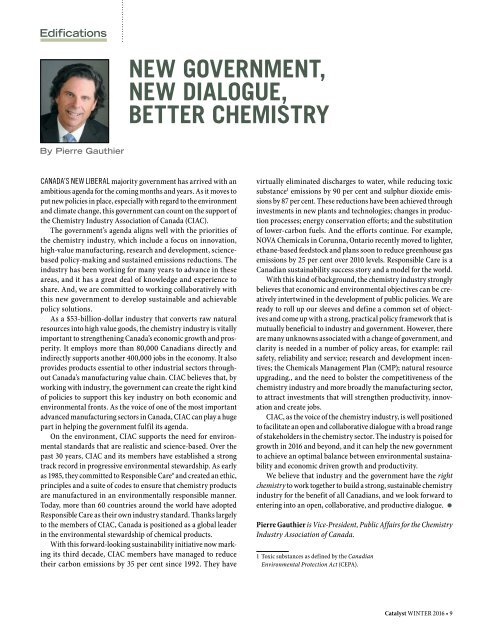Catalyst
AhI4301WMFq
AhI4301WMFq
Create successful ePaper yourself
Turn your PDF publications into a flip-book with our unique Google optimized e-Paper software.
Edifications<br />
NEW GOVERNMENT,<br />
NEW DIALOGUE,<br />
BETTER CHEMISTRY<br />
By Pierre Gauthier<br />
CANADA’S NEW LIBERAL majority government has arrived with an<br />
ambitious agenda for the coming months and years. As it moves to<br />
put new policies in place, especially with regard to the environment<br />
and climate change, this government can count on the support of<br />
the Chemistry Industry Association of Canada (CIAC).<br />
The government’s agenda aligns well with the priorities of<br />
the chemistry industry, which include a focus on innovation,<br />
high-value manufacturing, research and development, sciencebased<br />
policy-making and sustained emissions reductions. The<br />
industry has been working for many years to advance in these<br />
areas, and it has a great deal of knowledge and experience to<br />
share. And, we are committed to working collaboratively with<br />
this new government to develop sustainable and achievable<br />
policy solutions.<br />
As a $53-billion-dollar industry that converts raw natural<br />
resources into high value goods, the chemistry industry is vitally<br />
important to strengthening Canada’s economic growth and prosperity.<br />
It employs more than 80,000 Canadians directly and<br />
indirectly supports another 400,000 jobs in the economy. It also<br />
provides products essential to other industrial sectors throughout<br />
Canada’s manufacturing value chain. CIAC believes that, by<br />
working with industry, the government can create the right kind<br />
of policies to support this key industry on both economic and<br />
environmental fronts. As the voice of one of the most important<br />
advanced manufacturing sectors in Canada, CIAC can play a huge<br />
part in helping the government fulfil its agenda.<br />
On the environment, CIAC supports the need for environmental<br />
standards that are realistic and science-based. Over the<br />
past 30 years, CIAC and its members have established a strong<br />
track record in progressive environmental stewardship. As early<br />
as 1985, they committed to Responsible Care® and created an ethic,<br />
principles and a suite of codes to ensure that chemistry products<br />
are manufactured in an environmentally responsible manner.<br />
Today, more than 60 countries around the world have adopted<br />
Responsible Care as their own industry standard. Thanks largely<br />
to the members of CIAC, Canada is positioned as a global leader<br />
in the environmental stewardship of chemical products.<br />
With this forward-looking sustainability initiative now marking<br />
its third decade, CIAC members have managed to reduce<br />
their carbon emissions by 35 per cent since 1992. They have<br />
virtually eliminated discharges to water, while reducing toxic<br />
substance 1 emissions by 90 per cent and sulphur dioxide emissions<br />
by 87 per cent. These reductions have been achieved through<br />
investments in new plants and technologies; changes in production<br />
processes; energy conservation efforts; and the substitution<br />
of lower-carbon fuels. And the efforts continue. For example,<br />
NOVA Chemicals in Corunna, Ontario recently moved to lighter,<br />
ethane-based feedstock and plans soon to reduce greenhouse gas<br />
emissions by 25 per cent over 2010 levels. Responsible Care is a<br />
Canadian sustainability success story and a model for the world.<br />
With this kind of background, the chemistry industry strongly<br />
believes that economic and environmental objectives can be creatively<br />
intertwined in the development of public policies. We are<br />
ready to roll up our sleeves and define a common set of objectives<br />
and come up with a strong, practical policy framework that is<br />
mutually beneficial to industry and government. However, there<br />
are many unknowns associated with a change of government, and<br />
clarity is needed in a number of policy areas, for example: rail<br />
safety, reliability and service; research and development incentives;<br />
the Chemicals Management Plan (CMP); natural resource<br />
upgrading., and the need to bolster the competitiveness of the<br />
chemistry industry and more broadly the manufacturing sector,<br />
to attract investments that will strengthen productivity, innovation<br />
and create jobs.<br />
CIAC, as the voice of the chemistry industry, is well positioned<br />
to facilitate an open and collaborative dialogue with a broad range<br />
of stakeholders in the chemistry sector. The industry is poised for<br />
growth in 2016 and beyond, and it can help the new government<br />
to achieve an optimal balance between environmental sustainability<br />
and economic driven growth and productivity.<br />
We believe that industry and the government have the right<br />
chemistry to work together to build a strong, sustainable chemistry<br />
industry for the benefit of all Canadians, and we look forward to<br />
entering into an open, collaborative, and productive dialogue. <br />
Pierre Gauthier is Vice-President, Public Affairs for the Chemistry<br />
Industry Association of Canada.<br />
1 Toxic substances as defined by the Canadian<br />
Environmental Protection Act (CEPA).<br />
<strong>Catalyst</strong> WINTER 2016 • 9


